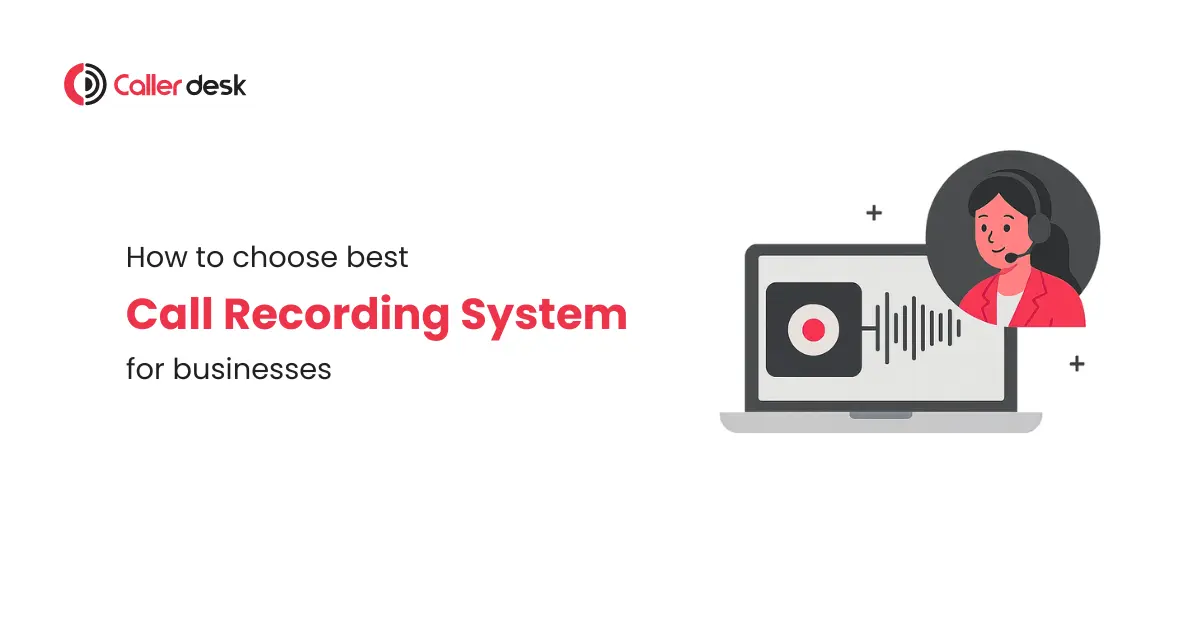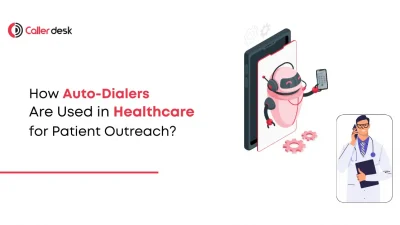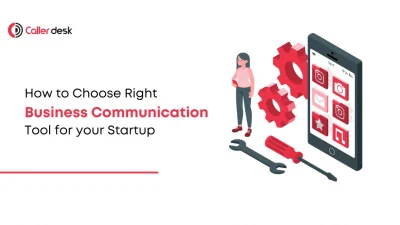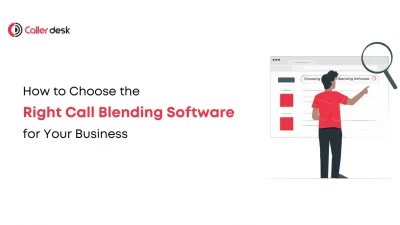Every business talks to customers on the phone — for support, sales, or service. But after the call ends, how do you remember exactly what was said?
What if a customer says, “Your team promised me something,” but your team doesn’t remember that?
What if you want to check how well your staff is talking to customers?
This is where a call recording system helps. It records your phone calls so you can listen to them later. This makes it easier to:
- Solve customer complaints
- Train new employees
- Improve your service
- Stay safe with rules and laws
But not all call recording tools are the same. Some are easy, some are confusing. Some stores call safely, others don’t.
Let’s understand it step by step — in simple language.
What Is Call Recording Software?
A call recording system is software or a tool that automatically records phone conversations. It can capture both incoming and outgoing calls made through your business phone lines.
Once recorded, these calls are saved securely, so you can go back and listen to them whenever needed.
Why Businesses Use Call Recording Systems:
- Review conversations to understand what was said during a call
- Handle customer complaints by checking the actual discussion
- Train new employees using real-life examples
- Follow legal rules, especially in industries where recording is required
There are two types of systems:
- Some require you to start or stop the recording manually
- Others record calls automatically in the background without needing any action from you
The right system depends on your business needs — but most modern tools prefer automatic recording to avoid missed data and save time.
Why Your Business Needs a Call Recording System
Still wondering if you really need call recording software for your business?
Let’s break it down. The right call recording system does more than just save calls — it gives you insight, protection, and performance control.
1. Ensure Consistent Service Quality
You can’t improve what you don’t measure. By recording calls, you can actually hear how your team interacts with customers.
- Are they polite and professional?
- Are they following your call scripts?
- Are they solving problems efficiently?
Listening to real customer interactions helps managers coach better, fix tone issues, and improve service delivery across the board.
2. Speed Up Employee Training
Training new hires doesn’t have to be slow and repetitive.
With business call recordings, you can let new team members learn from actual conversations instead of just theory.
Let them hear:
- How top agents open calls
- What to say during objections
- How to end calls on a positive note
It saves time, improves understanding, and builds confidence quickly.
3. Resolve Disputes With Confidence
Disagreements are part of doing business.
But when customers claim, “Your agent said this,” or “I was promised that,” you don’t have to guess — you just play the call.
Having call recordings as proof helps you:
- Protect your team
- Avoid misunderstandings
- Build trust with transparency
It’s like having a safety net for your conversations.
4. Stay Compliant with Industry Laws
In many sectors like banking, insurance, healthcare, and legal, call recording is not optional — it’s mandatory.
The right call recording software helps you:
- Play legal disclaimers like “This call may be recorded…”
- Securely store recordings in the cloud
- Prove compliance when audited
If you’re operating in or with regulated industries, this is a must-have.
5. Understand What Customers Really Want
Every customer call is filled with feedback — but are you capturing it?
By reviewing your business call recordings, you’ll discover:
- What confuses your customers
- What services they ask for
- Where your process is falling short
This isn’t just useful for support — it also helps your marketing, product, and strategy teams build better experiences.
What to Look for in the Best Call Recording Software
Choosing the right call recording software means picking a system that’s reliable, easy to use, and fits your business needs.
Here’s what to consider:
1. Automatic Call Recording
You shouldn’t have to press a button every time a call starts. The system should record:
- All incoming calls
- All outgoing calls
- All calls routed through your IVR or support lines
This ensures nothing important gets missed.
2. Secure Cloud Storage
Call data is sensitive. It should be stored in a secure environment with encryption and access control.
Look for:
- Cloud-based storage
- Password-protected access
- Admin-level permissions only
Security is non-negotiable.
3. Quick Search and Easy Access
A good system allows you to find any call in seconds — even if it’s from weeks ago.
You should be able to:
- Filter by phone number
- Search by agent name
- Sort by call date or duration
This saves time, especially when you need to verify a conversation quickly.
4. Instant Playback and Download
You should be able to play any recording directly from your dashboard or download it for sharing, training, or review — no special tools or tech skills required.
Speed and ease of access matter, especially during customer escalations.
5. Built-In Legal Features
The system should support compliance with local laws by:
- Letting you add a call disclaimer message
- Keeping a log of recorded calls
- Managing storage timelines according to retention policies
If you’re dealing with customers in multiple regions, legal support features are a must.
6. Insights and Reporting Tools
Call recording isn’t just about storage — it’s also about analysis.
Look for tools that help you:
- Track call volume by agent or team
- Monitor average call length
- Identify top performers or common issues
This turns call data into actionable insight you can use to improve operations.
Best Practices for Using Call Recording
Recording calls also means following some rules. Here’s what every business should keep in mind:
1. Inform Customers
Always play a message before the call starts. For example:
“This call may be recorded for training or quality purposes.”
This keeps you legal and builds customer trust.
2. Limit Access
Only managers or trusted staff should be able to hear call recordings. CallerDesk allows role-based access control.
3. Define Purpose
Make it clear why you’re recording calls — such as for training, quality checks, or legal proof. Do not use the recordings for other reasons without informing customers.
4. Set a Time Limit for Recordings
Don’t keep call recordings forever. Decide how long to keep them — 30, 60, or 90 days — and delete old ones regularly. CallerDesk lets you set this automatically.
5. Audit Regularly
Listen to call samples every week or month to check for any issues, mistakes, or improvement areas.
6. Train Employees
Make sure your team knows:
- What recordings can be used for
- How to keep customer data safe
- How to respond if customers ask about recordings
7. Choose a Compliant Vendor
If your call data is stored on the cloud, make sure the vendor follows Indian data laws and secure practices. CallerDesk already meets these requirements.
Why CallerDesk Is a Smart Choice for Your Business
CallerDesk is a cloud-based call recording system made for Indian businesses. Here’s how it supports you:
1. No Hardware, No Hassle
CallerDesk is completely cloud-based.
You don’t need to install any physical servers or devices. Everything runs online — so you save money, time, and IT effort.
2. Every Call Is Automatically Recorded
Whether it’s an incoming sales inquiry or an outgoing support call, every business call is recorded by default.
No one needs to press a button or remember to enable anything — it just works.
3. Secure Access with Role-Based Control
Recordings are stored safely in the cloud with restricted admin-only access. CallerDesk allows you to assign access permissions based on team roles.
4. Search and Filter in Seconds
Looking for a specific call from last Tuesday?
CallerDesk’s dashboard lets you filter by date, phone number, or agent name to find the exact recording you need.
5. Instant Playback and Download
Every recording is available with just one click.
You can listen directly in the dashboard or download the file to use for training or reporting.
6. Built-In Legal Compliance
CallerDesk helps you stay on the right side of the law.
You can set automatic call disclaimers like:
“This call may be recorded for training or quality purposes.”
The platform also supports compliance with Indian call recording laws, DLT guidelines, and NDNC regulations.
7. Detailed Team-Wise Call Analytics
Want to know how your agents are performing?
CallerDesk gives you insights into:
- Call volume per agent
- Common quality issues
- Missed call patterns
- Training gaps
Conclusion
The best call recording system is one that helps your business grow while keeping your operations smooth, secure, and professional.
It should be:
- Easy to use
- Legally compliant
- Helpful for training and quality checks
- Reliable during customer disputes
CallerDesk offers all these benefits in one place — with zero setup and full control over your recordings. It’s the smart choice for Indian businesses that want a strong, secure, and scalable call recording solution.
Frequently Asked Question
1. What is a call recording system and how does it work?
A call recording system is software that automatically records incoming and outgoing phone calls. These recordings are saved securely and can be accessed later for review, training, dispute resolution, or compliance.
2. How do I choose the best call recording software for my business?
To choose the best call recording software, look for features like automatic recording, secure cloud storage, easy playback and download, search filters, role-based access, and legal compliance. Also, ensure it matches the size and needs of your business.
3. Is it legal to record phone calls in India for business purposes?
Yes, it is legal to record phone calls for business use in India, as long as you inform the caller beforehand. Adding a disclaimer like “This call may be recorded for quality purposes” is required to stay compliant with Indian telecom laws.
4. What are the benefits of using a call recording system in a company?
A call recording system helps companies improve customer service, train employees with real call examples, resolve customer complaints, ensure quality control, and meet legal and industry compliance requirements.
5. Can I record calls automatically without pressing a button?
Yes, many modern call recording systems offer automatic recording. Once set up, the software captures all incoming and outgoing calls without needing manual input, helping avoid missed or forgotten recordings.





